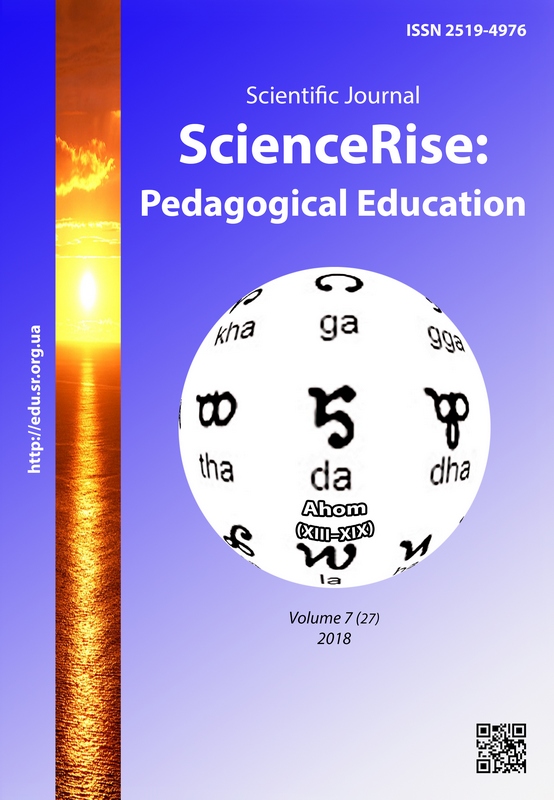Методи і форми тьюторства та менторства у закладах вищої освіти Німеччини
DOI:
https://doi.org/10.15587/2519-4984.2018.152388Ключові слова:
тьютор, ментор, тьюторіал, кваліфікація тьюторів, забезпечення якості у в вищій освітіАнотація
У статті виконано аналіз методів і форм тьюторства та менторства у закладах вищої освіти Німеччини. Дослідження включає порівняльний аналіз різних ЗВО Німеччини, спільні риси та відмінності при реалізації тьюторства та менторства. Зазначено, що Німеччина входить до ряду країн, в яких система тьюторства та менторства реалізується на найвищому рівні з урахуванням особливостей різних ЗВО. Варто зазначити, що особливу роль в координації роботи тьюторів та менторів у закладах вищої освіти Німеччини відіграє Мережа тьюторів. Мережа забезпечує спілкування між спеціалістами різних ЗВО, відповідає за вирішення складних ситуацій та розробляє стратегію на наступні роки. Окремої уваги заслуговує кваліфікація тьюторів. Незважаючи на відмінності системи тьюторства та менторства у різних ЗВО, існують загальні принципи функціонування відповідно до автономності кожного закладу вищої освіти. Більшу увагу приділяють підготовці тьюторів, оскільки ментори, здебільшого, є працівниками ЗВО, виконують організаційні та психологічні функції і є спеціалістами відповідно до свого освітньо-кваліфікаційного рівня. Тьютори проходять ряд кваліфікаційних заходів, семінарів та тренінгів. В кінцевому результаті вони отримують сертифікати. Під час тренінгів та навчальних модулів для тьюторів, їх не лише навчають методики викладання, але й ознайомлюють з кейс-методами для вирішення конкретних проблем. Це зумовлено збільшенням кількості іноземних студентів та необхідності в нестандартних підходах в роботі з іноземцями. Стаття також відображає зміщення акцентів в тьюторській та менторській діяльності. Якщо, кінець ХХ століття характеризується появою тьюторства та менторства у більшості ЗВО, початок ХХІ століття – системністю тьюторської та менторської діяльності, то на сьогодні особливий акцент робиться на кваліфікації та сертифікації тьюторів. В статті показано, що рівень готовності тьюторів до проведення тьюторіалів безпосередньо впливає на успішність студентів та забезпечення якості в навчальному процесі
Посилання
- Pleschova, G., Simon, E., Quinlan, K., Murphy, J., Roxa, T., Szabo, M. (2012). The professionalization of Academics as Teachers in Higher Education. Standing Commettee for the Social Sciences (SCSS). Science Position Paper, 32.
- Kröpke, H., Brinker, T.; Eckehard, M. (Ed.) (2008). Das Tutorenprogramm an der Hochschule Niederrhein. Wer, wo, wie und wie viele Schlüssel-Kompetenzen? Wege und Erfahrungen aus der Praxis an Hochschulen. Recklinghausen.
- Kröpke, H., Szczyrba, B.; Behrendt, B., Voss, H.-P., Wildt, J. (Eds.) (2006). Wer stützt den Sherpa? Tutorenweiterbildung als Investition in Qualität der Lehre. Neues Handbuch Hochschullehre (Griffmarke F 6.5). Stuttgart: Raabe, 2006.
- Wörner, A. (2006). Lehren an der Hochschule. Eine praxisbezogene Anleitung. Wiesbaden: Verlag für Sozialwissenschaften.
- Мaliarchuk, О. V. (2009). Vykladach v systemi dystanciynoho navchannia [Teacher in the system of distant learning]. Pedagogical process: theory and practice, 2, 169–178.
- Netzwerk Tutorienarbeit an Hochschulen. Available at: http://www.tutorienarbeit.de/
- The Mittelhessen Univeristy of Applied Sciences. Available at: https://www.thm.de/site/
- University of Wuerzburg. Available at: https://www.uni-wuerzburg.de/en/university/
- Fulda University of Applied Sciences. Available at: https://www.hs-fulda.de/en/
- Ruiz, N., Fandos, M. (2014). The role of tutoring in higher education: improving the student’s academic success and professional goals. Revista Internacional de Organizaciones, 12, 89–100. doi: http://doi.org/10.17345/rio12.89-100
##submission.downloads##
Опубліковано
Як цитувати
Номер
Розділ
Ліцензія
Авторське право (c) 2018 Oksana Ivanytska

Ця робота ліцензується відповідно до Creative Commons Attribution 4.0 International License.
Наше видання використовує положення про авторські права Creative Commons CC BY для журналів відкритого доступу.
Автори, які публікуються у цьому журналі, погоджуються з наступними умовами:
1. Автори залишають за собою право на авторство своєї роботи та передають журналу право першої публікації цієї роботи на умовах ліцензії Creative Commons CC BY, котра дозволяє іншим особам вільно розповсюджувати опубліковану роботу з обов'язковим посиланням на авторів оригінальної роботи та першу публікацію роботи у цьому журналі.
2. Автори мають право укладати самостійні додаткові угоди щодо неексклюзивного розповсюдження роботи у тому вигляді, в якому вона була опублікована цим журналом (наприклад, розміщувати роботу в електронному сховищі установи або публікувати у складі монографії), за умови збереження посилання на першу публікацію роботи у цьому журналі.









